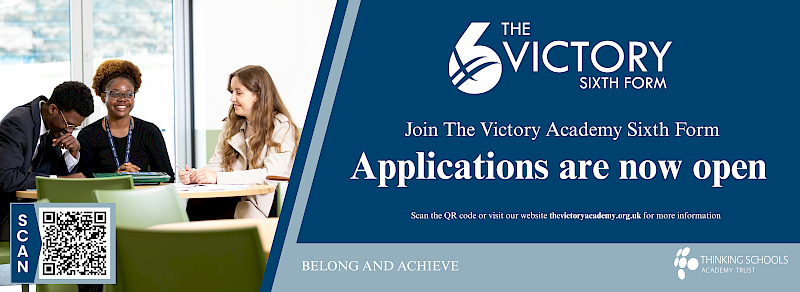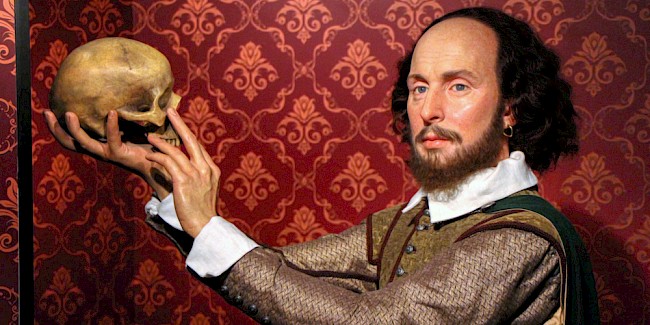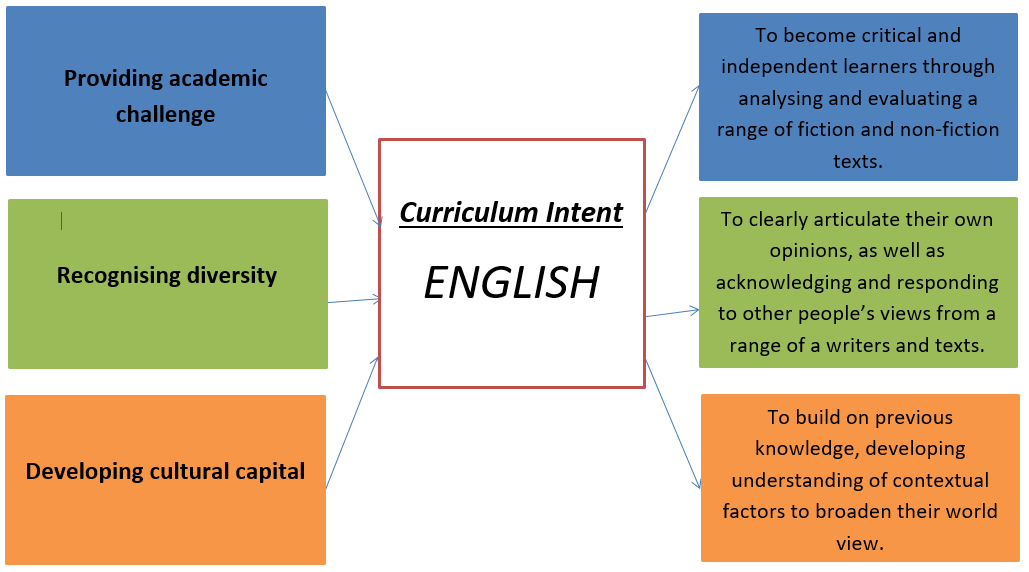
Applications for The Victory Academy Sixth Form are now open! To apply please click here.

Applications for The Victory Academy Sixth Form are now open! To apply please click here.
In English our aim is to


Our vision for English at The Victory Academy is to encourage all students to connect with the outside world and become global citizens. This will be addressed through the key disciplines of English: reading, writing, and oracy. Our focus is to increase cultural capital through developing on students’ contextual knowledge, building on previous knowledge as well as intertextuality to help broaden our students’ ability to explore the many layers of a text. Equipped with this knowledge, students will not only be able to clearly articulate their own opinions but also recognise other people’s views with maturity and empathy in a variety of modes and forms. Finally, the English department aims to foster critical and independent learners whose love of the subject and connection to the ‘human condition’ launches in KS3, builds into KS4 and further to KS5 level
We teach a rich, varied, and relevant curriculum that is in line with the national curriculum. Our curriculum not only prepares our students for the rigours of GCSE Language and Literature but develops their questioning and critical skills as well. We strive to evoke enjoyment from the written and spoken word. Our texts are taken from the traditional canon and from contemporary writers of both fiction and non-fiction.
The Victory Academy’s intent is integral to our curriculum where staff provide academic challenge, recognise diversity and develop cultural capital for all pupils. We study a range of poetry in all year groups exploring ideas of identity and conflict. The poets we study are taken from diverse backgrounds and encourage students to not only explore the written word but to question and think critically.
The novels, plays and non-fiction we study also encourage students to explore ideas about identity, power and conflict. This includes Shakespearean plays, contemporary novels, adaptations of Gothic fiction, pre 1900 non-fiction and contemporary articles. Students are exposed to the key concepts required to access the GCSE texts throughout KS3 and concepts are carefully mapped and sequenced to build skills and knowledge over time.
We not only encourage students to examine good quality writing and explore the effects created but encourage students to develop their own writing voice. Creative writing is highlighted in all units so students are able to practise their craft often and to build upon skills continually.
Our Library has a rich collection of fiction and non-fiction and is a hive of activity during breaks where students can read, study quietly or access the computers. KS3 students have access to Renaissance Learning where they work on the Accelerated Reader system to build upon their reading skills selecting books from witing their ZPD level. All KS3 students read for a minimum of ten minutes at the start of every lesson as our intention is that all students develop an appreciation of a good book and the benefits of reading.
Our curriculum builds up the skills of students over the five years they attend The Victory Academy. Classes are set in KS3 and Year 11 but Year 10 are taught in mixed ability groups and students’ studies culminate in 2 separate qualifications: AQA GCSE English Language and AQA GCSE English Literature.
In Year 7 we assess students’ literacy needs when they arrive through a range of internal and external information which allows for baseline assessment, enabling us to support and stretch all students (including the most disadvantaged) appropriately as quickly as we can. Strategies such as Literacy withdrawal groups are set up in line with the SENCo and the LSA team, as well as teacher intervention through the analysis of Star Reading and Accelerated Reader.
The skills essential to clear and competent communication and skilful reading are introduced in year 7 and the level of difficulty is gradually increased as students move up the year groups. David Didau’s deconstructed essay is introduced in Year 7, with skills built up through to Year 9 where comparison is introduced. Furthermore, slow writing sentence structures for creative and persuasive writing are embedded across the three years of KS3, ensuring our students are equipped with the best possible skills to express themselves.
In Year 7 our students explore the theme of ‘Journeys’, both literal and metaphorical, allowing them to experience the journey from Primary to Secondary and life at The Victory Academy. In Year 8 our students explore the theme of ‘Identity’, allowing them the opportunity to look at what identity means in relation to themselves as well as those around them. Finally, in Year 9 our students explore the theme of ‘Power and Conflict’, considering what power looks like through a range of concepts linking to conflict: war (including WW1 and WW2), gender, class, race, and within oneself. The ideas of the KS3 curriculum are in place to prepare our students for key ideas and concepts that are evident within the GCSE English Literature course.
Each unit of work has a focus on five tier 2 ‘grow words’ to allow students to become articulate communicators, as well as gaining confidence in their use of subject specific terminology, both identifying and writing about it but to also use it. Many of these words are revisited in future years and learning becomes embedded. The school’s Thinking Tools are embedded into the planning and teaching of each unit and staff use research to inform their approaches to specific skills, groups of students and texts studied. Oracy is integral to our units with many opportunities for students to share ideas verbally in pairs, small groups, or with the whole class, developing their confidence in speaking aloud for later life.
In addition, our KS3 curriculum journey reflects the KS3 History curriculum to enhance our students’ cultural capital development, encouraging them to see how events in history influence writers through time and the significance this can have on the context of a text. This inclusion furthers students’ knowledge on the impact texts can have when delivering morals or lessons to their readership. In KS4, Christianity and its impression on writers and texts is also considered, linking to ideas presented to students through their KS3 Victory Citizenship lessons.
At KS3 we cover a range of texts. We have introduced more diverse and contemporary fiction and poetry, such as ‘Ghost Boys’ by Jewell Parker Rhodes, ‘Terror Kid’ by Benjamin Zephaniah and poetry by a range of poets such as John Agard and Imitiaz Dharker. These are read alongside more traditional texts which are in the Canon, such as: ‘Oliver Twist’, ‘The Tempest’, ‘Animal Farm’ and classic poetry. KS3 students will also experience specific non-fiction writing through units such as Travel Writing, Famous Speeches and a Media unit specifically designed to help students decide if they would like to study GCSE Media.
At Key Stage 4 we teach: ‘An Inspector Calls’, the Power and Conflict collection, ‘A Christmas Carol’ and ‘Macbeth’. Key concepts and skills will already have been introduced at KS3 and teachers build on this good foundation by introducing more complexity in the texts covered, the ideas explored, and the ways students express their ideas. An academic writing style is encouraged and explicitly taught.
The Language course explores fiction and non-fiction from the 19th to 21st centuries and students are required to develop their skills of analysis, evaluation, and comparison. Students are also required to write with clarity and creativity developing their skills of description, narrative, and opinion writing.
Homework is regularly set and is used to encourage students to retrieve information, pre learn and practice skills. Homework is set on-line, and teachers set a range of tasks across the year including written responses, reading, and reviewing tasks and on-line platforms.
Effective learning comes when students can reflect on their achievements and learning, and so, we encourage teachers to mark diagnostically and teach responsively. Students are formatively assessed throughout the curriculum both through written responses and verbally. The curriculum is carefully planned but the formative assessment encourages teachers to alter their teaching to respond to marking or conversations with students and to address the needs of the specific group in front of them. As a department, we use formative assessment and diagnostic marking to allow us to focus in on the specific gaps in learning a particular class or student has and enable them to succeed in more formal assessments.
We mark using school set criteria for KS3 through English specifics but use GCSE criteria for KS4. Books are provided with a WWW and an EBI so students can reflect upon the skills required to be successful at GCSE Language and Literature.
All students follow AQA GCSE English Language and Literature courses and will have one lead teacher for both courses. The GCSE course has its foundations in the KS3 course that precedes it, so students should arrive at Key Stage 4 having a clear sense of the skills required.
Students’ progress is monitored throughout their time at The Victory Academy. This allows us to not only celebrate when students have successfully mastered a skill or written creatively, but to step in and offer specific support to allow students to continue to progress and to leave school literate and able to access the next steps in their lives.
Students are assessed termly to check the development of skills and understanding of content. At Key Stage 4 students also sit a series of mocks that cover all the topics in the final exams. These summative assessments inform teachers and students of the next steps required and will inform the students’ predictors which appear on their reports.
To ensure there is consistency in the marking of students’ work that informs our predictors and target setting, we regularly standardise our marking and moderate marked work. This is completed in line with AQA examiner expectations and uses resources provided by department and the exam board.
We encourage students to be confident, caring and engaged and students respond well to the ambitious standards set by the English team. We strive to enable all students to make progress.
Our vision is for students to leave The Victory Academy with an understanding of the world around them and be equipped with the literacy skills which enable them to be successful. Our hope is students leave The Victory Academy creative and critical thinkers who have developed an appreciation, if not a love, of great writing.
In KS5, students are preparing for A Level English Literature. The examination board is Edexcel. Our students will be developing their interest in, and enjoyment of, literature and literary studies. They are expected to read widely and independently both set texts and others that they have selected for themselves. They will engage critically and creatively with a substantial body of texts and ways of responding to them as well as developing, and effectively applying, their knowledge of literary analysis and evaluation in fluent, well expressed, written responses.